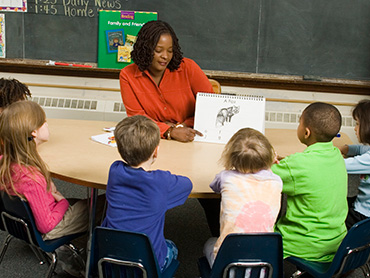What happens to a third-grade student who fails a standardized reading test in the spring? In some states, that student may be required to repeat the third grade. Fourteen states enacted policies in 2012 that either require or strongly recommend that schools hold back third-grade students who fail standardized reading tests. How do such policies impact our students and schools?
 This New York Times article, published last month, discusses the challenges. One concern, the article asserts, is adequate resources. Often the students who fail the standardized test are required to attend literacy programs, but the length of the programs (six weeks in the summer, for example) may be insufficient to make enough of a difference. Funding for such programs doesn’t always increase accordingly, either.
This New York Times article, published last month, discusses the challenges. One concern, the article asserts, is adequate resources. Often the students who fail the standardized test are required to attend literacy programs, but the length of the programs (six weeks in the summer, for example) may be insufficient to make enough of a difference. Funding for such programs doesn’t always increase accordingly, either.
In addition, fewer students are meeting proficiency guidelines now than in the past, largely because proficiency guidelines have become more rigorous. This could mean a greater number of third graders will be held back in coming years.
The article emphasizes the need, voiced by teachers across the country, to focus on reading much earlier than third grade. “Although many of the new state laws do include provisions requiring schools to identify and support students who show signs of reading difficulties as early as kindergarten, the biggest focus does not come until third grade, along with the consequences for schools and students,” the article states. If reading curricula and teacher training were stronger between pre-K and third grade, fewer third-grade students would be failing.
We couldn’t agree more with the need to place a strong focus on reading in the early grades. That’s we offer several intervention programs, targeting all aspects of reading development, that begin at an early first-grade level. Our newest program, Funēmics®, is entirely pre-grapheme and ideal for use in pre-K and Kindergarten.
Despite a range of opinions on this topic, one truth is universal: nobody wants our students to fail. We’d love to hear your thoughts on the article, and we’d love to work with you this year to ensure your students are poised to succeed. Get in touch today, and let us know how we can help.
 Share your student’s success story—nominate him or her for our Star of the Month award. Win a Barnes & Noble gift card for the student and a Read Naturally gift certificate for your class!
Share your student’s success story—nominate him or her for our Star of the Month award. Win a Barnes & Noble gift card for the student and a Read Naturally gift certificate for your class!
Post a New Comment